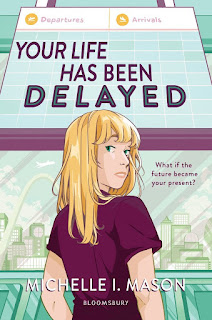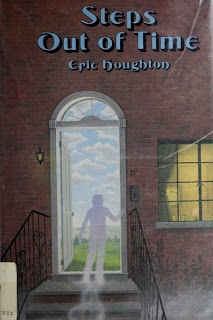This week's timeslip story,
Legend of the Storm Sneezer, by Kristiana Sfirela (middle grade, May 2020 Monster Ivy Publishing) is one that will please the young reader who likes magical heroines that are easy to cheer for in rule-bending mystery solving!
When Rose was just a baby winged angel (like everyone else around her, not babies, that is, but people with wings), her innate magic manifested when she sneezed out a storm cloud. The cloud, Stormy, was her best friend, and living with rainfall and electrical sparking as she chased legends in the woods near her home was fine.
Until it wasn't anymore.
When Stormy was deemed too dangerous and just plain wrong for a girl who was the heir to the Commander of her town, Rose's father paid a witch doctor to trap her magic deep inside her, unable to manifest beyond a few sparks. That was still too much for her family, though, and so Rose is packed of to Heartstone, an asylum for those with unstable magic are looked up.
Happily Heartstone turns out not to be a fearful prison, but instead is more like a magical boarding school, where its inmates, though still unfree, can live happy lives, and learn, and create. And even make friends.
But Heartstone is in danger. It was built on the site of a long-ago battle between angels and wolf-like wargs, and the ghost of both sides are pressing closer and closer to its walls, in violate of the old agreement made by the asylum's founders.
Rose, her spirit unbroken by the trauma inflicted on her, is determined to find out what is happening. Fortunately, she doesn't have to do it on her own; she has good friends and a loyal, ghost-spotting, dog on her side. She also (and this is where the time-slippness comes into the story) is getting letters from her future selves, that don't offer direct advice, but do have useful clues. And Stormy, too, isn't quite gone...which is good, because the ghosts aren't the real problem. The real problem is much worse.
I had reservations when I started the book--I really don't like intrusive narrators breaking the fourth wall, and it starts with an eyeful of that. And I was a bit concerned that it would fall too far into fantasy whimsy for me to enjoy. But once Rose gets to Heartstone, the story rips along very nicely indeed, and I was able to start sincerely enjoying her adventures!
And I was rewarded with a story that became bigger in scope as it went on, the sort of story I like even better than just magical school stories, one where past wrongs much be come to terms with or else the present will be destroyed. So although I never stopped being bothered by breaks in the fourth wall (like getting poked while peacefully reading, and kicking me out of the story), I ended up enjoying this very much.
(one thing that did strike me as distractingly odd is that although all the angel folk have wings and can fly, there is very little flying, and none of it particularly advances the plot. The wings could have been left out, and nothing would have been appreciably different....and I think I'd have enjoyed it more if they'd been just people and not angels; "angel" comes with so many religious connotations in our world, although not in this fictional world, that it was distracting.)
nb re time travel--a future Rose does come back in person a few times, making this slightly more time-travelly than just the letters would have been. But it still could have functioned as story just fine with out the time travel element, which I found slightly disappointing...until I got to the end, with its strong and welcome hints of more time-travel-ness to come!




















